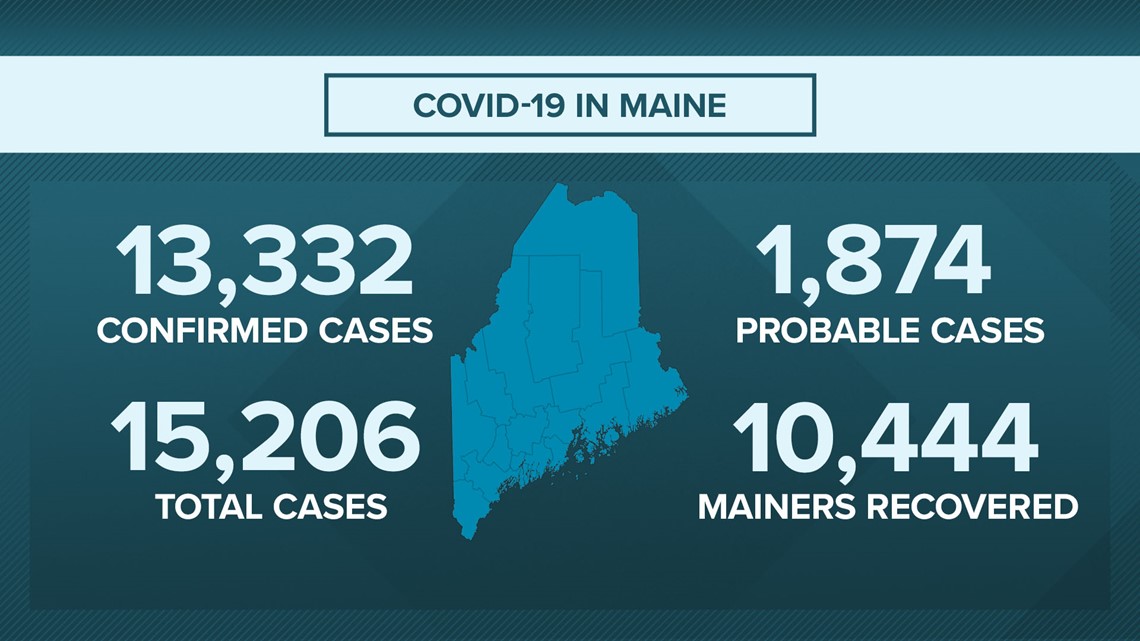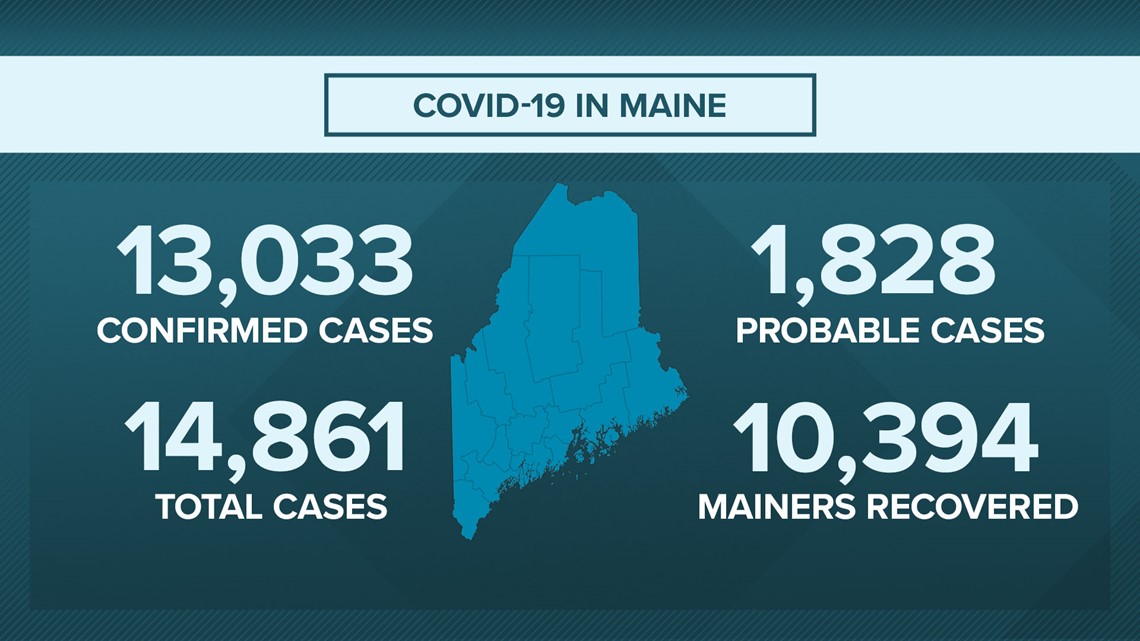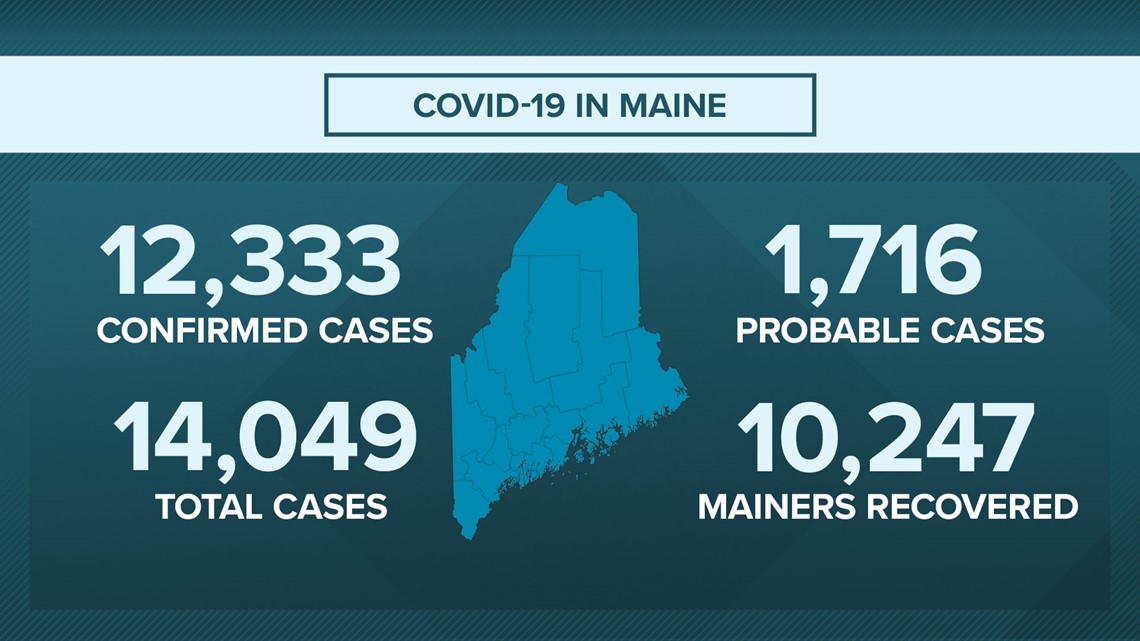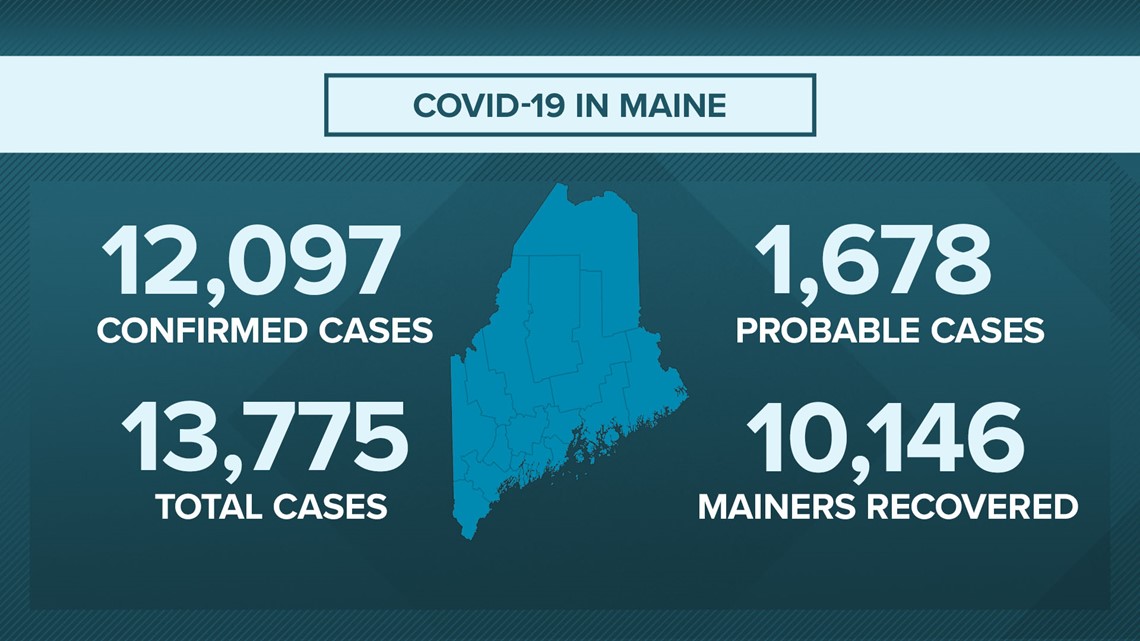MAINE, USA — KEY MAINE CORONAVIRUS FACTS
- As of Friday, Maine CDC announced 345 additional COVID-19, coronavirus cases.
- 250 Mainers have died out of 15,206 total COVID-19 cases. 13,332 of these cases are confirmed by tests and 1,874 are probable.
- 855 Mainers have been hospitalized, 10,444 Mainers have recovered.
- Governor Janet Mills updates COVID-19 travel restrictions
- Coronavirus face coverings now mandated by the state
- VERIFY: Requirement to wear a face mask does not violate constitutional rights
- Maine is open for business, here's what you need to know
- Read about all the important coronavirus-related orders currently in place in Maine
- Going out? CDC shares tips to stay safe amid coronavirus pandemic
- Filing for unemployment still dominating discussions around Maine. Here's our story on how to file for Maine unemployment. You can scroll down for more resources available to Mainers
- If you are a business owner, please register your business. If you want to support a local business, enter your zip code and find out what’s OPEN NEAR YOU.
- Subscribe to 'break time with NEWS CENTER Maine' our new newsletter. Delivered to your email inbox for your break time.
FRIDAY, DECEMBER 11
The Maine CDC reported four additional deaths of people with COVID-19. The state death toll stands at 250 deaths.
The Maine CDC reported 345 additional COVID-19 cases.
Of the 15,206 total COVID-19 cases in Maine, 13,332 are confirmed by tests and 1,874 are probable.
855 Mainers have been hospitalized at some point during their COVID-19 illnesses.
10,444 Mainers have recovered from COVID-19.
Gov. Janet Mills will join Maine CDC Director Dr. Nirav Shah and Maine DHHS Commissioner Jeanne Lambrew for Friday's 2 p.m. state coronavirus update. NEWS CENTER Maine will stream it live on air, as well as on our website, Facebook, Twitter, YouTube, and mobile app.
- Mills issues order requiring operators of indoor public spaces to deny entry to people without face coverings
- Maine submits second request for COVID-19 vaccine, would combine for enough to vaccinate 50,525 people
- Mills administration commits final $6.8M of $1.25 billion in federal coronavirus relief funding
- FDA head expects Pfizer vaccine to be approved soon for emergency use
- Exposure feared after New Hampshire speaker dies of COVID-19
- Classic Maine holiday traditions adapt amid COVID-19 pandemic
- Maine’s bishop: Support ‘common good,’ get COVID-19 vaccine
- Hockey family business hit hard by the pandemic
- Mobile home sales stay strong along with the rest of the housing market
- Cheverus High School to close Friday following first case of COVID-19
- Mills Administration announces one-time relief payment for Mainers unemployed due to COVID-19
- 'Mission 3/65' aims to help small businesses in Portland


Friday Coronavirus Briefing
Shah
The Maine CDC reported four additional deaths on Friday:
- A man in his 80s from Hancock County
- A woman in her 80s from Hancock County
- A woman in her 80s from Oxford County
- A woman in her 70s from Penobscot County
Currently in Maine, 182 people are in the hospital with COVID-19, 50 of whom are in an intensive care unit; 16 are on a ventilator.
On Friday, Maine CDC opened the following outbreak investigations:
- McMahon Elementary School in Lewiston: Four cases
- Otter Brook Child Care in Fairfield: Four cases
- Presque Isle High School: Five cases
- Sacopee Valley Elementary School in Hiram: Three cases
- Security System Services: Three cases
- Toddle Inn Child Care in Gorham: Three cases
On Thursday, Maine CDC opened the following outbreak investigations:
- Enclave of Scarborough: Four cases
- Gardiner Area High School: Four cases
- Zippel Elementary School in Presque Isle: 10 cases
- The Inn at Village Square in Gorham: 16 cases
- Noble Middle School in Berwick: Four cases
- Seaside Rehab and Health Care in Portland: Three cases
- Toddle Inn in Scarborough: Six cases
- Whitney Energy in Lincoln: Four cases
As of Friday morning, more than 1 million COVID-19 test results have been reported to Maine CDC.
At the Maine CDC laboratory in Augusta, over 200,000 tests have been conducted since the beginning of its activation.
The Public Health Emergency Preparedness Program has filled close to 4,000 orders for PPE across the state, totaling almost 3.3 million pieces of PPE statewide.
Last week, the Maine CDC shortened the quarantine time from 14 days to 10 days, following new U.S. CDC guidance. Shah said Friday that update extends to those traveling into Maine. However, Shah says there are and remain differences between travel and close contact. You can test out of the travel quarantine, but if you are a close contact of someone who has been confirmed to have COVID-19, you must stay in quarantine for the full 10 days, regardless of a negative test.
On Friday, the Maine DHHS and Maine CDC placed a second order for COVID-19. Read more about that order here.
Mills
Mills, whose quarantine after being exposed to COVID-19 has now ended, maintains she believes she would have gotten the virus if the member of her security team who tested positive hadn't been wearing a mask, or if she hadn't been wearing a mask. Mills tested negative for the coronavirus.
On Friday, Mills announced an executive order strengthening the statewide mask mandate. Moving forward, owners and operators of all indoor public spaces – regardless of the type of entity or size – must not allow those who refuse to wear a face covering to enter or remain in their venue. Previous executive orders had required enforcement in some but not all public settings.
Read more about the order here: Mills issues order requiring operators of indoor public spaces to deny entry to people without face coverings
"Anyone who still insists on entering a store, or other facility, without wearing a face mask or insists of taking it off after they get inside they can be and should be removed and charged with criminal trespass," Mills said.
Mills said, "I know we share enthusiasm about a vaccine, but as Dr. Shah has said several times–this is no time to let down our guard. This is the time to keep our guard up, and make sure that the vaccine will be able to work in the coming months and we have to keep ourselves protected."
Closing businesses and schools and requiring people to stay home, especially during the holidays, is not something Mills said she wants to do.
"We're running out of available public health tools to reduce the spread of COVID-19," Mills said. "If today's targeted steps don't work, more severe restrictions might be necessary.
Mills said measures like business closures and gathering limits–like some other states have recently done–are a last resort because they have such great impacts on peoples' lives and livelihoods.
Maine has now committed the entire allotment of federal funding.
"Without additional funds from Congress, our workers and our businesses would be hit even harder than last spring if we were forced to take so many restrictions, take so many additional measures to save lives in the coming weeks and months."
THURSDAY, DECEMBER 10
The Maine CDC did not report any additional deaths of people with COVID-19. The state death toll stands at 246 deaths.
The Maine CDC reported 407 additional COVID-19 cases.
Of the 14,861 total COVID-19 cases in Maine, 13,033 are confirmed by tests and 1,828 are probable.
834 Mainers have been hospitalized at some point during their COVID-19 illnesses.
10,394 Mainers have recovered from COVID-19.
The Maine CDC's next state coronavirus update is scheduled for 2 p.m. on Friday.
- US reports single-day record for coronavirus deaths
- Panel gives Pfizer COVID-19 vaccine final look Thursday before US decision
- Mills Administration announces one-time relief payment for Mainers unemployed due to COVID-19
- Mother fights to stay with disabled daughter through COVID-19 hospitalization
- Shah: Coronavirus vaccine will not bring a 'fairytale ending' to pandemic
- Trump virus coordinator Birx seeks role in Biden government
- Maine health centers awarded nearly $3.7M in federal funds to combat COVID-19


WEDNESDAY, DECEMBER 9
The Maine CDC reported 7 additional deaths of people with COVID-19, bringing the state death toll to 246.
An additional 405 cases were reported Wednesday. Of the 14,454 total cases, 12,678 are confirmed and 1,776 are probable.
In total, 819 Mainers have been hospitalized with COVID-19.
The Maine CDC is set to hold a coronavirus briefing today at 2 p.m., which we will stream live on-air, on our website and mobile app, as well as on our Facebook, Twitter, and YouTube pages.
Maine CDC Director Dr. Nirav Shah will lead the coronavirus briefing.
The additional deaths reported Wednesday are:
- A man in his 100s from Androscoggin County
- A man in his 80s from Cumberland County
- A woman in her 90s from Hancock County
- A man in his 80s from Hancock County
- A woman in her 80s from Androscoggin County
- A man in his 80s from Cumberland County
- A man in his 50s from York County
Shah says four of these individuals died Tuesday, and three died on Monday.
Shah noted the man who was in his 100s who died perhaps survived the last world's pandemic in 1918, the Great Depression, two world wars, and many world events.
Just in the past 30 days, 252 people have been hospitalized with COVID-19. Currently, 173 are in the hospital; 42 are in critical care, and 15 are on a ventilator. Right now, there are 84 ICU beds available in Maine.
The seven-day PCR positivity rate is 4.7 percent, down a bit from the relative high of about 4.9 percent a few days ago. The PCR testing volume stands at 640 tests for every 100,000 people. To put that positivity rate into perspective, the national PCR positivity rate is upwards of 9 percent, Shah says.
The antigen positivity rate is 5.28 percent with a testing volume of about 156 tests for every 100,000 people.
The Maine CDC has opened the following new outbreak investigations since Monday's update:
- Enterprise car rental: Three cases
- Pinnacle Health Care facility in North Berwick: Five cases
- Seal Rock health facility: Four cases
- Windham Middle School: Six cases
- Lewiston Police Department: 16 cases
- York Hospital: Four cases
With respect to where Maine stands in the vaccine process, Shah said, "a vaccine for this pandemic can't come soon enough."
Right now, Maine's plan focuses on vaccinating those most vulnerable and essential workers. Specifically, Shah says they are focused on distributing and vaccinating health care providers, hospitals, and first responders.
Shah said they don't know when a vaccine may be authorized or if a vaccine will be authorized this week. If one is authorized, he says they've been told it may possibly be arriving in Maine in the days thereafter.
"Maine CDC has been preparing for months upon months for this day to come," Shah said. "For me it's a bit like a relay race–we are ready to have Operation Warp Speed and the federal government pass the baton over to us. But as with any relay race, we've got to start running even before the baton lands in our hand. And that's what we've been doing for months now."
"I think we all have this hope that the arrival of a vaccine will quickly bring an end to the pandemic," Shah said. "That the pandemic will go out the way that it came–with a resounding bang. I'm sorry say–that won't happen. The end of a pandemic is not like a switch being turned off. It's not like a fairytale ending. We all wish that this vaccine would bring things to a quick and rapid close, but unfortunately, pandemics don't really end that way."
Shah explains that even after a particular threshold of people are vaccinated, the scientific reality is there will still be cases of COVID. A vaccine slows the rate of transmission for a population. A vaccine works to reduce the transmission rate, to reduce the number of people that each new case gives COVID to to hopefully below one.
But even in that world, it still means, for example, that for every 100 new cases, there still might be 70 or 80 new cases that they've given it to, Shah explains.
Shah says because of this, the good public health habits that we have now, such as social distancing, wearing a mask, etc., may be things we need to keep with us for some time. These habits will not disappear, even after a vaccine starts arriving, Shah says. They will still be just as important, and maybe even more important.
Shah talked about how we can set ourselves up for maximal vaccine success.
According to recent research, any COVID vaccine will be much less effective at preventing death or illness if the vaccine is introduced into a population where the virus is already raging, which sadly, Shah says, is the case in many parts of the U.S.
A coronavirus vaccine is maximally effective when it is introduced into a community where the virus is better controlled.
"Where you end up depends on where you start," he said.
What we can do now to set ourselves up for maximal success in Maine is slow down the proverbial speeding train as much as possible so that on the day the vaccine can start being distributed, we will be able to more quickly and efficiently stop it.
Shah says the bottom line is–the better we do now, the better we all do later.
"It's imperative that starting today, we take an effective, fact-based approach by doing the things we've talked about (like wearing face coverings and practicing physical distancing). Let's do what we can do now so that when a vaccine arrives, we are maximally prepared."
Of the backlog of cases Shah reported during Monday's briefing, he emphasized it is "completely unacceptable" and the Maine CDC is using every available resource to get through the cases. But in addition to the 4,000 cases that are backed up, there are increasing numbers of new cases every single day.
Wednesday evening, Portland Public Schools announced that East End Community School would be remote-only Thursday and Friday after two positive cases at the school resulted in 24 close contacts quarantining.
Meals will be available for students at Portland, Deering and Casco Bay high schools and at Talbot Community School from 1 p.m. to 2 p.m. both days.
TUESDAY, DECEMBER 8
The Maine CDC reported 12 additional deaths of people with COVID-19. The state death toll now stands at 239 deaths.
The additional deaths reported Tuesday were:
- A woman in her 70s from Androscoggin County
- A woman in her 80s from Androscoggin County
- A woman in her 80s from Androscoggin County
- A woman in her 70s from Androscoggin County
- A man in his 80s from Aroostook County
- A woman in her 80s from Cumberland County
- A woman in her 80s from Cumberland County
- A woman in her 70s from Cumberland County
- A woman in her 70s from Hancock County
- A man in his 80s from Kennebec County
- A woman in her 90s from York County
- A man in his 80s from York County
The Maine CDC reported 274 additional COVID-19 cases.
Of the 14,049 total COVID-19 cases in Maine, 12,333 are confirmed by tests and 1,716 are probable.
803 Mainers have been hospitalized at some point during their COVID-19 illnesses.
10,247 Mainers have recovered from COVID-19.
The next Maine CDC state coronavirus update is scheduled for 2 p.m. Wednesday.
- 'COVID-19 guilt': A mother of three describes the emotional aftermath of her kids testing positive
- 'Unprecedented surge' in COVID-19 cases leads to 'difficult' changes in Maine CDC's approach to case investigations
- Maine DHHS redeploys team of call center staff to support people who test positive for COVID-19
- Maine DHHS closes three offices after positive COVID-19 test


MONDAY, DECEMBER 7
The Maine CDC reported 427 additional COVID-19 cases, which is the most cases reported in Maine on a single day since the pandemic began.
The Maine CDC did not report any additional deaths of people with COVID-19. The state death toll stands at 227 deaths.
Of the 13,775 total COVID-19 cases in Maine, 12,097 are confirmed by tests and 1,678 are probable.
781 Mainers have been hospitalized at some point during their COVID-19 illnesses.
10,146 Mainers have recovered from COVID-19.
Maine CDC Director Dr. Nirav Shah and Maine DHHS Commissioner Jeanne Lambrew will hold a coronavirus briefing on Monday at 2 p.m. NEWS CENTER Maine will stream it live on air, as well as on our website, Facebook, Twitter, YouTube, and mobile app.
- Portland's entire Bramhall and Engine 11 Fire Stations call out sick out of an abundance of caution concerning COVID-19
- Trump lawyer Rudy Giuliani in hospital after positive COVID-19 test
- Rapid COVID-19 tests in Maine likely to run short without more federal funding
- US vaccine chief thinks COVID-19 shots will be long-lasting
- Lawmakers say next COVID-19 relief bill won't offer $1,200 checks


Monday Coronavirus Briefing
Dr. Nirav Shah, director of the Maine CDC, leads the coronavirus briefing on Monday.
Currently, 170 people are hospitalized with COVID-19 in Maine–52 of whom are in the ICU, and 17 of whom are on a ventilator.
The Maine CDC has opened one new outbreak investigation on Monday, one on Sunday, and nine on Saturday.
The outbreak opened Monday was at the Flood Brothers Farm in Clinton where they are aware of 13 cases.
On Sunday, an investigation was opened at Lake View Terrace, an assisted living facility in Lincoln, where there are 13 cases.
Investigations opened on Saturday:
- The Baker Company in Sanford: Three cases
- Dirigo Middle School
- Fruit Street School
- Ranger Memorial School
- Nichols in Portland
- Noble High School
- Washburn Dowdy Shipbuilding firm
- York High School (reopened): Eight cases
Maine's seven-day PCR test positivity rate is 4.7 percent; the seven-day antigen test positivity rate is 4.5 percent.
The Maine CDC is making changes to the way they investigate COVID-19, Shah said. In recent weeks, Maine has experienced significant increases in cases, hospitalizations, and deaths.
For example:
- The seven-day moving average of new cases in Maine now stands at 291. Just one week ago, it was 168. That's a 73 percent increase just in one week, Shah explains.
- Right now, there are 170 people in the hospital. One week ago, it was 139–a 22 percent increase in hospitalizations just in the past seven days.
- A week ago, the positivity rate was about 3.95 percent; today it's 4.7 percent.
- Shah says just in the past seven days, 33 people have died with COVID-19.
Shah says the Maine CDC has been preparing for this increase for weeks by redeploying internal staff, bringing on members of the National Guard, worked with DHHS to bring on additional staff to assist, as well as hiring staff.
"We are not slowing down with any of those processes at all," Shah said. "But sadly, we were already experiencing a surge of cases, and last week, things accelerated even more and we began experiencing a surge on top of a surge."
Over the past two days, Shah says the Maine CDC has identified two interrelated concerns: the rapidly growing number of lab reports that they must review every day and the need to assign them for investigation to ensure the focus is on the highest risk, most vulnerable individuals.
Shah explains that each and every positive test result is reported to the Maine CDC, and is then reviewed by someone. That someone has to review whether it's a new case of COVID-19, or an existing person who has been logged in the system. He says they need to make sure when they're getting a lab result that they're not duplicating cases.
They also need to make sure the test results themselves are not duplicates, because Maine is what is called a dual reporting state, meaning the Maine CDC often gets two versions of the same lab report–one might come from the lab and another might come from the person's doctor.
Every one of the lab reports the Maine CDC gets has to go through a process to ensure it's not a duplicate.
"All of that requires a thorough review to ensure that when we have a case, it is a new case, not an existing case," Shah says. "Accuracy matters in this process, because what's at stake is an accurate daily case count."
Shah says in recent days, the Maine CDC has developed a gap–the number of new lab reports that have been coming into the Maine CDC has been exceeding their ability to do that review process on a daily basis. For example, on Friday alone, the Maine CDC received 650 reports.
"We foresaw that this increase was coming and we believed we could keep up with it," Shah said. "But the surge on top of the surge that we saw last week challenged that process."
This is not a backlog at the CDC lab, Shah says. The number of cases they still have to review does not affect things like positivity rate or the number of people in the hospital. All the same, the Maine CDC faced this issue, and knew they needed to make some changes.
Another concern that arose was what the Maine CDC does with those cases after they are confirmed as new cases of COVID-19.
With a focus of preserving the ability to address the needs of highest-risk individuals in Maine as well as those who they care for or who care for them, "these discussions and decisions were extremely difficult and they were unpalatable, but they were also necessary in these times of an unprecedented surge."
The sustained increase in new cases and new lab reports has outpaced Maine CDC's ability to continue the approach that has taken us where we are right now, Shah says. As a result, they have had to make changes to the way the Maine CDC goes about investigating changes.
Until now, every person who tested positive received a case investigation from the Maine CDC. But in light of the increasing number of new cases, Maine CDC is announcing the following changes to the Maine CDC case investigation protocol.
The Maine CDC will continue to conduct case investigations within the following groups: those who are 18 and younger, 65 and older, health care workers or first responders, people who are hospitalized, people who are identified as being part of a demographic that has had a higher burden of disease in Maine, people who have a disability, people who are living or working in congregate living settings, and individuals associated with schools or child care facilities.
Individuals who fall outside of those groups may not receive a full case investigation. However, they will continue to receive notifications, as well as offers of assistance and support from Maine DHHS.
Maine DHHS is creating a new service for individuals who do not fall into the categories Shah mentioned.
RELATED: Maine DHHS redeploys team of call center staff to support people who test positive for COVID-19
"The changes that I've outlined here have been very challenging," Shah said. "The discussions, not easy. There were no easy choices in front of us."
As of this morning, the number of lab results awaiting review had grown to over 4,000. The Maine CDC is making efforts as quickly as they can to bring that back under control, Shah said. The changes being made to the case investigation process will enable the Maine CDC to focus their available public health resources on caring for the most vulnerable residents in Maine, and those who care for them.
"The bottom line for everyone is that right now, for where we are in the COVID-19 pandemic, Maine CDC finds itself sort of in the position of a very busy, crowded emergency room. And just like in any emergency room, we have to take our available resources to make sure we are serving those who are in the highest need at their greatest moment of need."
These changes are internal to the Maine CDC and do not affect things like testing, PPE, or care you may receive.
It means that if you test positive, the first thing Shah asks you to do is promptly isolate and separate from others to lower the risk of spread. He also asks that if you test positive, think about who you have come into close contact with and notify them as soon as possible. If you're not in one of the groups mentioned above, you will not hear from the Maine CDC, so Shah is urging people to be proactive and notify your close contacts yourself as soon as possible.
To be clear, this means if you do not fall into one of those high-priority groups, you will not be assigned a "case investigator" to go through the contact tracing process; you will be responsible for identifying your own close contacts and contacting them yourself. But there is a third option available now through Maine DHHS, which will give you a notification of your positive result and will offer support and guidance.
"These choices are incredibly difficult," Shah concluded. "[...] But we're in a position where there are no easy options in front of us. We at the state will continue to do everything we can to continue the processes, bring more people on, to hire more, to continue staying on top of the virus as much as we can. But sadly, we're in a situation where just like at the emergency room, some difficult decisions have to be made."
RESOURCES
- Maine food resources and retail adjustments
- How to file for Maine unemployment
- Beginning of plan to reopen Maine schools
- Will you get a stimulus check if you receive Social Security or disability, or didn’t file a tax return?
- Stimulus check calculator: See how much you'll likely be getting
- Millions of Americans will soon get stimulus checks. But here's who won't.
- Maine small businesses can apply for 'forgivable loans'
Coronavirus, COVID-19 Background
The official name for the coronavirus is “SARS-CoV-2” and the disease it causes is named “coronavirus disease 2019” or “COVID-19” for short. Coronavirus is a family of viruses, which can infect people and animals. The viruses can cause the common cold or more serious diseases like SARS, MERS, and COVID-19.
The CDC says symptoms of the coronavirus include fever, cough, difficulty breathing, and in some cases sore throat.
The CDC says there are simple steps to take to reduce the possible spread of COVID-19:
- Wash your hands often with soap and water for at least 20 seconds or use alcohol-based hand sanitizer
- Avoid close contact with people who are sick
- Avoid touching your eyes, nose, and mouth with unwashed hands
- Stay home while you're sick and avoid close contact with others
The Maine Centers for Disease Control (CDC) is holding coronavirus briefings on Tuesdays and Thursdays with director Dr. Nirav Shah to keep the public up to date on the situation in Maine

